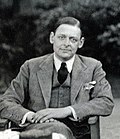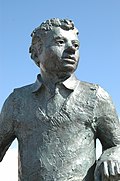
Back بوابة:شعر Arabic প্রবেশদ্বার:কবিতা Bengali/Bangla دەروازە:شیعر CKB Portal:Poesía Spanish Portail:Poésie French Portal:Poesia Occitan Портал:Поэзия Russian Портал:Шигърият Tatar Portal:詩歌 Chinese
Welcome to the Poetry Portal


Poetry (from the Greek word poiesis, "making") is a form of literary art that uses aesthetic and often rhythmic qualities of language to evoke meanings in addition to, or in place of, literal or surface-level meanings. Any particular instance of poetry is called a poem and is written by a poet. Poets use a variety of techniques called poetic devices, such as assonance, alliteration, euphony and cacophony, onomatopoeia, rhythm (via metre), and sound symbolism, to produce musical or incantatory effects. Most poems are formatted in verse: a series or stack of lines on a page, which follow a rhythmic or other deliberate pattern. For this reason, verse has also become a synonym (a metonym) for poetry.
Poetry has a long and varied history, evolving differentially across the globe. It dates back at least to prehistoric times with hunting poetry in Africa and to panegyric and elegiac court poetry of the empires of the Nile, Niger, and Volta River valleys. Some of the earliest written poetry in Africa occurs among the Pyramid Texts written during the 25th century BCE. The earliest surviving Western Asian epic poem, the Epic of Gilgamesh, was written in the Sumerian language.
Early poems in the Eurasian continent evolved from folk songs such as the Chinese Shijing as well as from religious hymns (the Sanskrit Rigveda, the Zoroastrian Gathas, the Hurrian songs, and the Hebrew Psalms); or from a need to retell oral epics, as with the Egyptian Story of Sinuhe, Indian epic poetry, and the Homeric epics, the Iliad and the Odyssey. (Full article...)
Selected article

Four Quartets is a set of four poems written by T. S. Eliot that were published individually over a six-year period. The first poem, Burnt Norton, was written and published with a collection of his early works following the production of Eliot's play Murder in the Cathedral. After a few years, Eliot composed the other three poems, East Coker, The Dry Salvages, and Little Gidding, which were written during World War II and the air-raids on Great Britain. The poems were not collected until Eliot's New York publisher printed them together in 1943. They were first published as a series in Great Britain in 1944 towards the end of Eliot's poetic career.
Four Quartets are four interlinked meditations with the common theme being man's relationship with time, the universe, and the divine. In describing his understanding of the divine within the poems, Eliot blends his Anglo-Catholicism with mystical, philosophical and poetic works from both Eastern and Western religious and cultural traditions, with references to the Bhagavad-Gita and the Pre-Socratics as well as St. John of the Cross and Julian of Norwich.
Although many critics find the Four Quartets to be Eliot's great last work, some of Eliot's contemporary critics, including George Orwell, were dissatisfied with Eliot's overt religiosity. Later critics disagreed with Orwell's claims about the poems and argued instead that the religious themes made the poem stronger. Overall, reviews of the poem within Great Britain were favourable while reviews in the United States were split between those who liked Eliot's later style and others who felt he had abandoned positive aspects of his earlier poetry. (Full article...)
Selected image

Poetry WikiProject

Selected biography

Although Thomas was appreciated as a popular poet in his lifetime, he found earning a living as a writer difficult, which resulted in his augmenting his income with reading tours and broadcasts. His radio recordings for the BBC during the latter half of the 1940s brought him to the public's attention and he was used by the Corporation as a populist voice of the literary scene. In the 1950s, Thomas travelled to America, where his readings brought him a level of fame, though his erratic behaviour and drinking worsened. His time in America cemented Thomas' legend, where he recorded to vinyl works such as A Child's Christmas in Wales. (Full article...)
Did you know (auto-generated) -

- ... that when her local cafe was in lockdown, Kate Baer wrote her bestselling poems in her van in the cafe parking lot?
- ... that the tallest captive elephant in Asia has been commemorated in verse, sculpture and film?
- ... that Manuel Carpio's 1849 poem is the earliest literary depiction of the weeping ghost La Llorona?
- ... that Micah Joseph Lebensohn began to translate poetry into Hebrew at the age of twelve?
- ... that in The Arraignment of Paris, poet Denis Glover stated Charles Allan Marris was the "arbiter of all our art and letters / presenting rotten apples to his betters"?
- ... that the "Poetic Essay of the Great Bliss of the Sexual Union of Heaven and Earth and Yin and Yang" argues that heterosexual sex is the "ultimate human pleasure", but affirms homosexuality as well?
Selected poem
| Beyond Seas by Sohrab Sepehri |
|---|
|
I shall build a boat |
Related portals
Topics
Recognized content
Categories
Associated Wikimedia
The following Wikimedia Foundation sister projects provide more on this subject:
-
Commons
Free media repository -
Wikibooks
Free textbooks and manuals -
Wikidata
Free knowledge base -
Wikinews
Free-content news -
Wikiquote
Collection of quotations -
Wikisource
Free-content library -
Wikiversity
Free learning tools -
Wiktionary
Dictionary and thesaurus
© MMXXIII Rich X Search. We shall prevail. All rights reserved. Rich X Search




















